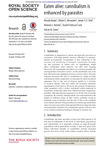Eaten alive: cannibalism is enhanced by parasites
| dc.contributor.author | Bunke, Mandy | en_US |
| dc.contributor.author | Alexander, Mhairi E. | en_US |
| dc.contributor.author | Dick, Jaimie T.A. | en_US |
| dc.date.accessioned | 2016-06-25T01:57:14Z | |
| dc.date.available | 2016-06-25T01:57:14Z | |
| dc.date.issued | 2015 | en_US |
| dc.identifier.other | HPU4160217 | en_US |
| dc.identifier.uri | https://lib.hpu.edu.vn/handle/123456789/21717 | en_US |
| dc.description.abstract | Cannibalism is ubiquitous in nature and especially pervasive in consumers with stage-specific resource utilization in resource-limited environments. Cannibalism is thus influential in the structure and functioning of biological communities. Parasites are also pervasive in nature and, we hypothesize, might affect cannibalism since infection can alter host foraging behaviour. We investigated the effects of a common parasite, the microsporidianPleistophora mulleri, on the cannibalism rate of its host, the freshwater amphipodGammarus duebeni celticus. Parasitic infection increased the rate of cannibalism by adults towards uninfected juvenile conspecifics, as measured by adult functional responses, that is, the rate of resource uptake as a function of resource density. | en_US |
| dc.format.extent | 5 p. | en_US |
| dc.format.mimetype | application/pdf | en_US |
| dc.language.iso | en | en_US |
| dc.publisher | The Royal Society | en_US |
| dc.subject | Biology | en_US |
| dc.subject | Behaviour | en_US |
| dc.subject | Ecology | en_US |
| dc.subject | Parasitism | en_US |
| dc.subject | Cannibalism | en_US |
| dc.subject | Amphipod | en_US |
| dc.subject | Behaviour | en_US |
| dc.title | Eaten alive: cannibalism is enhanced by parasites | en_US |
| dc.type | Book | en_US |
| dc.size | 348KB | en_US |
| dc.department | Education | en_US |
Files in this item
This item appears in the following Collection(s)
-
Education [806]

